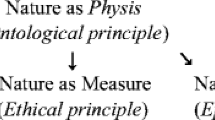Abstract
Anselmian theists claim (a) that there is a being than which none greater can be conceived; and (b) that it is knowable on purely—solely, entirely—a priori grounds that there is a being than which none greater can be conceived. In this paper, I argue that Anselmian Theism gains traction by conflating different interpretations of the key description ‘being than which no greater can be conceived’. In particular, I insist that it is very important to distinguish between ideal excellence and maximal possible excellence. At the end of my paper, I illustrate the importance of this distinction by applying my discussion to the recent defence of Anselmian Theism in Nagasawa (Philos Q 58:577–591, 2008).
Similar content being viewed by others
References
Nagasawa Y. (2008) A new defence of Anselmian Theism. Philosophical Quarterly 58: 577–591
Oppy, G. (1998). Critical notice of Frank J. Tipler (1995) The physics of immortality. The Secular Web Library. http://www.infidels.org/library/modern/graham_oppy/tipler.html
Oppy G. (2000) Colonising the galaxies. Sophia 39: 117–142
Oppy G. (2006) Philosophical perspectives on infinity. Cambridge University Press, Cambridge
Sobel J. (2004) Logic and theism. Cambridge University Press, Cambridge
Tipler F. (1994) The physics of immortality. Macmillan, London
Author information
Authors and Affiliations
Corresponding author
Rights and permissions
About this article
Cite this article
Oppy, G. Perfection, near-perfection, maximality, and Anselmian Theism. Int J Philos Relig 69, 119–138 (2011). https://doi.org/10.1007/s11153-010-9268-z
Received:
Accepted:
Published:
Issue Date:
DOI: https://doi.org/10.1007/s11153-010-9268-z



